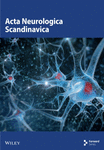CA-antibody: an immunological marker of thymic neoplasia in myasthenia gravis?
Abstract
Abstract We have examined sera from 141 patients with myasthenia gravis and 11 non-myasthenia gravis patients with thymoma for antibodies to a citric acid extract of skeletal muscle (CA-antibodies). Sera were obtained from 5 different centers. The thymus histology was defined in each case. Sera from 56/66 patients (85%) with thymoma contained CA-antibodies, while such antibodies were only detected in 6/75 (8%) of the non-thymoma patients. None of the patients with thymus hyperplasia had CA-antibodies. One MG patient who developed MG after a bone-marrow transplantation, also developed CA-antibodies. The remaining 5 CA positive non-thymoma MG patients were all >65 years and had thymic atrophy. Two of them had myasthenia gravis and polymyalgia rheumatica. In 2 thymoma patients with non-detectable levels of CA-antibodies before thymectomy, such antibodies were demonstrated in high titres after the operation. In 2 other sera from thymoma patients, the titres of CA-antibodies fell to <32 after thymectomy. There were 3 sera with CA-antibodies among 11 sera from non-MG patients with thymic tumours.




